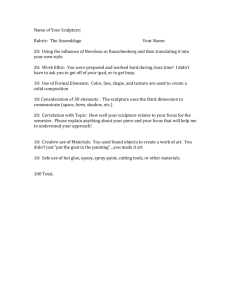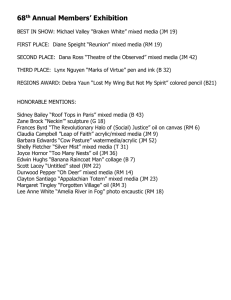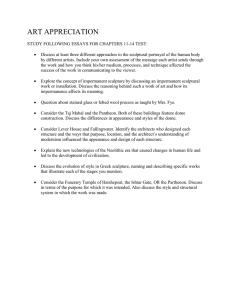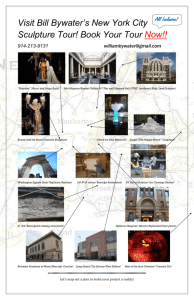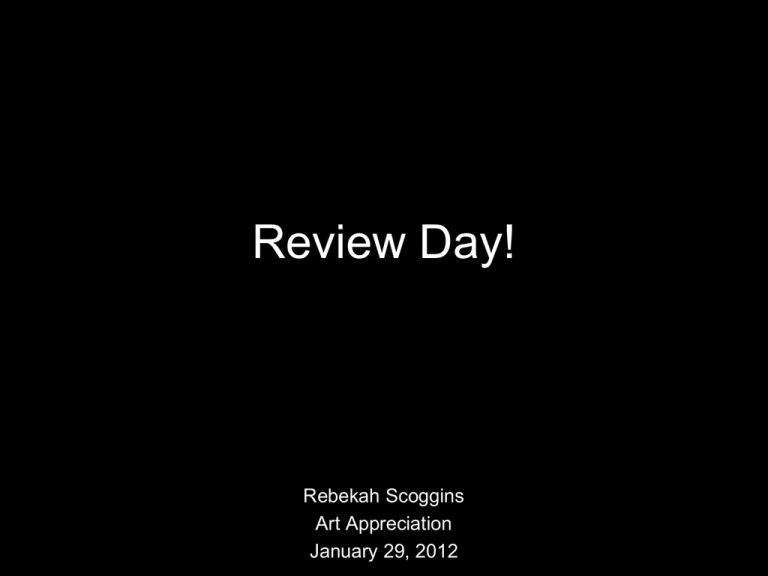
Review Day!
Rebekah Scoggins
Art Appreciation
January 29, 2012
Format of the Exam
• 15 slide IDs, 90 seconds each, 2 pts each, 30 pts total
– Artist, title, date, and medium for most works (also the
location if Fresco)
– Artist, title, date, and location for architecture
– Each part of your answer is worth ½ a point.
– You get a 3 year cushion on your dates. Ex: If the date is
1914 and you say 1916, you still get credit.
• 10 short answers, 5 pts each, 50 pts total
– Answer in complete sentences.
• 1 essay, Choose from 3 questions, 20 pts
– Answer in complete sentences in paragraph form.
– It should be multiple paragraphs and take you time to think
about and write.
– Remember, it’s 20 points of your test. Treat it as such.
Study Help
• Read through the information in the book
• Review your notes on the topics I outline in the study
guide
• Use flash cards for the slide IDs.
• Make sure you understand the general idea behind the
different methods of production (painting, sculpture,
photography, architecture, printmaking, film) and how
they progressed.
• Understand how to use and explain the terms on the
study guide
• Be able to give all the required information on the slide
ids.
• Look over the Power Points for important descriptions
Terms to Know
• Work of art – what an artist makes or puts in front of us
for viewing, the visual object (or product) that embodies
that idea the artist wanted to communicate.
• Medium (plural media) – a particular material along
with its accompanying technique, a specific type of
artistic technique or means of expression determined by
the use of particular materials
– Clay, fiber, stone, wood, paint, video, computer/digital, photograph,
movie
• Oil on canvas, silver gelatin print, etc
Functions of Art
Communicating Information
Day to Day Living
Worship and Ritual
Self Expression
Social Cause
Visual Delight
Art Criticism : Three Basic Theories
• Formal, aka formalism – focus attention on the
composition of the work and how it may have been
influenced, on a compositional level, by earlier works,
analyses these qualities over (or with no respect to) other
aspects of a work’s production, reception, subject matter,
or thematic significance.
• Contextual – considers art as a product of a cultural that
exists within a cultural and value system, within a
particular society as a particular time and place
• Expressive, aka biographical – pays attention to the
artists’s expression of a personality or worldview, takes
into account birthplace, gender, cultural background, etc.
Vertical line / Horizontal line
Diagonal line
Hard line / Soft line
Descriptors of Art
•
•
•
•
•
•
•
•
•
•
•
•
Shape
Mass
Space
Abstract Art
Representational Art
Composition
Foreground
Background
Time
Motion
Light
Color
Perspective
Linear vs Atmospheric
a. One-point linear perspective
b. One-point linear perspective. Cubes above
eye level, at eye level, and below eye level
c. Two-point linear perspective
Raphael. The School of Athens. 1508. Stanza della segnatura
(Room of the Signatura). Vatican Palace. Vatican City, Italy.
Raphael. The School of Athens.
Layout of Linear Perspective
Atmospheric
Perspective
Asher Brown Durand. Kindred Spirits. 1849. Oil on canvas. Painting
Scale
Claes Oldenburg and Coosje van Bruggen. Shuttlecocks. One of
four.©2011,
1994.
Aluminum,
Sculpture.
Copyright
©2009
Pearson Prentice
Hall Inc.
Proportion
Michelangelo Buonarroti. Pietà.
1501. Marble, Sculpture.
Roettgen Pietà. 1300–1325.
Painted Wood, Sculpture.
Types of Painting
• Watercolor
• Tempura
• Oil
• Advantages and Disadvantages?
Pigment
• Ancient – ground minerals, dried plant
juices, powdered animal urine, dried insect
blood
• Modern – synthetic pigment
Support
• Canvas
• Wood
• Paper
True Fresco
Giotto di Bondone, Interior View andThe Lamentation, True Fresco, Scrovegni
(Arena) Chapel (Architecture), 1305, Padua, Italy, Italian Renaissance
Types of Printmaking
• Relief
– Woodcuts / Woodblock
• Intaglio
– Engraving
– Etching
• Lithography
• Stencil
– Silkscreen / Screenprint
Sculpture
• Relief
– Low-relief
– High-relief
• Freestanding
• Casting
– Substitution process
– Mold
• Carving
– Subtractive process
• Assemblage
– Combine
– Mixed media
• Installation
• Site-specific
Dome (arch rotated 180°).
Copyright ©2011, ©2009 Pearson Prentice Hall Inc.
Dome on a cylinder.
Dome on
pendentives
Hagia Sophia. Interior. Istanbul, Turkey. 532–535.
International Style
Walter Gropius, Bauhaus, exterior, 1926-27, Dessau, Germany. International Style.
International Style
Ludwig Mies van der Rohe and Philip Johnson.
Seagram Building. New York. 1956–1958.
Cantilever
Frank Lloyd Wright. Fallingwater (Edgar Kaufmann Residence). Bear Run,
Pennsylvania. 1936.
Copyright ©2011, ©2009 Pearson Prentice Hall Inc.



